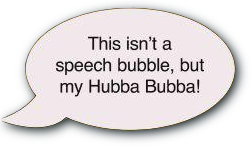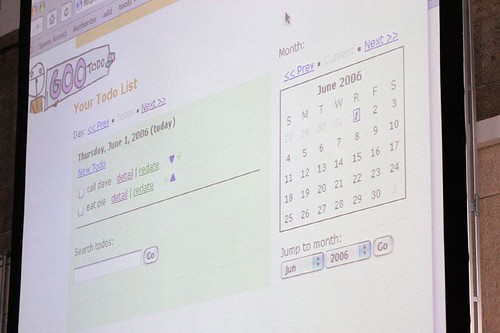Google Video is closing down. Last chance to watch…
Last chance to watch Spin
Last chance to watch Bill Buxton at IIT Institute of Design Strategy Conference 2008
Last chance to watch Aza Raskin – Death of the Desktop
Last chance to watch David Weinberger’ Everything is Miscellaneous
Last chance to watch The Archimedes Palimpsest
Last chance to watch The Science and Art of User Experience at Google
Last chance to watch Jared Spool: How to Design for Branding
Last chance to watch Douglas Adams’ Hyperland
Last chance to watch Alan Kay at OOPSLA ’97
Last chance to watch Engelbart at 4th Conf on Innovation Journalism 2007
Last chance to watch Zeitgeist Addendum
Last chance to watch Barry Schwartz’ Paradox of Choice
Last chance to watch Ted Nelson on Electronic Literature
What are your favorites?
PS_
some videos are also hosted on YouTube, e.g.:
Aza Raskin: http://www.youtube.com/watch?v=3UwZkKsWgc0
Jen Fitzpatrick: http://video.google.com/videoplay?docid=-6459171443654125383…
Spin : http://www.youtube.com/watch?v=ZwMB4WijqNo&playnext=1&am…
Winberger’s Everything is miscellaneous: http://www.youtube.com/watch?v=x3wOhXsjPYM
Category: Interface Culture
Hamburger Unkonferenz Raum Schiff Erde

Ahoi,
das Raum Schiff Er.de landet im Februar wieder im Jazzclub Stellwerk in Hamburg-Harburg. Wer dabei sein möchte, kann jetzt in unserem Wiki einchecken. Und obwohl am Programm noch fleißig gefeilt wird, zeichnet sich schon jetzt eine spannende und inspirierende Mischung ab.
Diverse Projekte aus den Bereichen Digitales, Interaktionsdesign, Internet, Philosphie und Lötkolben stellen sich vor und werden alleine durch das Motto “Ordung und Chaos” gebändigt!
(Kleiner fraktaler Scherz am Rande: Wofür steht das B. in Benoit B. Mandelbrot? )
Ich hoffe, dass wir an den Erfolg vom letzten Jahr anknüpfen, und dass wir den einen oder anderen Rebooter, Idealisten und Weltverbesserer auf der unkonventionellen Konferenz treffen werden. Hier nochmal die Links_
Es grüßen Matthias und die #RSE11 Crew
Sun Founders Panel 2006
I was a little concerned when I realized that a video has vanished from a Computer History Museum‘s page at the time when Sun’s website was reorganized during the transition to Oracle. It was an intriguing panel with Sun founders and pioneers Andy Bechtolsheim, Bill Joy, Vinod Khosla, Scott McNealy, and John Gage. Ironically I remember the quote
“Get them on tape before they die.”
And if you have them on tape, keep the video up regardless of any changing situations; you are a museum! But here is the good news (thanks Oliver): The webcast is still available on YouTube. Enjoy!
Some quotes at A Tribute to Sun Miscrosystems: A Night to Remember
Redundancy is sometimes the salvation of technology. Certainly in the case involving the supposed holdings of the Computer History Museum, without redundancy and YouTube, the Sun Microsystems Founders Panel (Bill Joy, Andy Bechtolsheim, Vinod Khosla, Scott McNealy and moderator John Gage) would have vanished forever since the video disappeared mysteriously from the museum’s web site during the confusion around the reorganization reflecting Oracle’s acquisition of Sun. Now, in all their glory, the founding four, courtesy of YouTube, share their personal stories of the early days at Sun.
SocialChat: Efficiency of E20
 Efficiency of Enterprise 2.0 tools. This was the subject we discussed in our SocialChat today. Read my tweets below (top down):
Efficiency of Enterprise 2.0 tools. This was the subject we discussed in our SocialChat today. Read my tweets below (top down):
- Lack of efficiency in the (communication) tools can be frustrating and eventually lead to poor effectiveness & minimal creativity.
- I see it this way: With a limited amount of energy and attention I want to work as much as possible in the effective&creative area. Spending my time in the basics, ie. finding my way to the info and people, is wasted for me and the company.
- efficiency w/o effectiveness is useless. efficiency is about effort and speed. Effectiveness is about results.
- E2.0 tools bear the potential to get faster into the results and solution corner of the spectrum. But only if there is a critical mass of people using the tools.
- The more people who use and contribute the higher the effectiveness for all of us. If the tools cannot cope with the demand, then we have a happy problem to solve.
- A “single social platform” definitely bears the advantage not to miss info&experts in dark branches of the intranet. At least all internal platforms need to be interconnected.
- E2.0 tolls create a flexible communication structure by ignoring the company’s org-chart. This is more efficient (and effective) than sending the info up the chain and down into another team.
- If the tools live up the the promise you can even communicate with people you don’t know upfront!
- I was happy to see (when coming from Sun) that the corporate yellow pages use tags. But tagging is complicated and there is almost no positive feedback loop in place to harvest the advantages of tagging.
- Tagging should be easy, as well as retrieving the clusters of knowledge and competence. I would like to see more efficiency to understand the swarm(!).
- I set up a Connect group to aggregate (= get a combined feed) for a couple of Oracle forums. This is much more efficient than checking the forums manually or receiving updates via mail
- My hope is that others follow my example, and that I can benefit from their cleverness regarding E2.0.
- Do it anyway because we benefit. Be cool. Be fast. Be more efficient and effective. And BTW_ tell others about your way of getting the job done.
This is, what I just did. Hope you enjoyed this posting.
See also Benefit of Social Media in Corporates? by Sreya Dutta
SocialChat on Sharing Best Practices
 This SocialChat touches the heart of Enterprise 2.0: Why is it challenging to share best practice? Once again, we had an interesting crowd together exchanging ideas at our internal microblogging channel. Read my share top down:
This SocialChat touches the heart of Enterprise 2.0: Why is it challenging to share best practice? Once again, we had an interesting crowd together exchanging ideas at our internal microblogging channel. Read my share top down:
- In my opinion “sharing best practice” has at least two problems:
1) The entry barrier is to high. If you ask yourself if your case is a good example for best practice, then it is likely that you say no. So asking for just the best is wrong. - 2) Collecting “best practice” is most of the time an after-though, once the project is done. But then you are already preparing for the next project and don’t have time to think about the previous lessons learned.
- Therefore “sharing best practice” needs to happen while you are still on the project. It should not be an extra step that causes extra work that nobody pays for.
- @gary Indeed, social software can help to identify the nuggets. But this can only happen if the information is easily accessible and has an URI to refer to. And of course #3) we need a culture of sharing, referring and recommending stuff.
- @amy “close communications” yes, but not “closed”. Other employees need to be able to participate.
- The trick is to exploit the selfish attitude of some people. (The altruistic do it anyway). The argument to convince the selfish and ego-centric is the following: …
- @amy Incentives don’t work. They don’t change the culture.
- @amy “What’s my benefit if you can do your job better and get a bonus?”
- As nobody is asking how to convince the selfish, I guess I keep the secret. :o)
- @frank Open source is all about sharing. And the s-curve in Sun’s recent visual brand was a symbol for sharing.
- @frank But I do not want to sound too enthusiastic. Reality was somewhere between the ideal and the average.
- The secret trick revealed in the final minute…
- Share with yourself! You gain something for your future projects if you blog some notes or fill some wiki pages about the current project for later use. (psst, others might do the same and you all benefit.)
Credits for the nice infinite icon: KPT #18
SocialChat on Getting Things Done
 If you are no longer suffering under Infoglut, you can focus on the things that matter in your daily business. Whatever that is, you want to get them done. How do you Get Things Done – what are your productivity tips? was the topic of our 13th SocialChat at Oracle. Here are my tweets in chronological order:
If you are no longer suffering under Infoglut, you can focus on the things that matter in your daily business. Whatever that is, you want to get them done. How do you Get Things Done – what are your productivity tips? was the topic of our 13th SocialChat at Oracle. Here are my tweets in chronological order:
- @SocialChat wait a sec. – my avatar is not done yet!!!
- bad planning is a challenge. No planning is even worse. But if you get into the flow all plans are forgotten and the guilt might come afterwards.
- there are four buckets for your tasks:
- urgent and important
- important but not urgent yet
- urgent but not important
- neither urgent nor important.
- As said: 4 buckets, get rid of the content of 1. [->try to avoid] 3. [->delegate] and 4. [->don’t do] and then work on the important but not urgent tasks. Then you have enough time to get the job done in high quality.
- ToDo lists don’t work for me b/c my tasks have different scopes, life spans and priority. But I like to check items off from a list when they are done. Celebrate success! (to a certain sense).
- I would love to try GOOTODO – The basic idea is to send emails to yourself in the future.

- And one for the road: “Without the last minute, nothing would get done.” –– bye everybody.
- Gootodo on lifehacker, Good Todo website
PS: my bookmarks on GTD at delicious.com/mprove/GTD
And next week in my series of SocialChats: The Next Big Thing!
SocialChat on Infoglut
 How to deal with Infoglut? This was the question in our internal weekly microblogging chat a couple of weeks ago. Here are my tweets. Hope they make some sense without revealing the other parties. I fliped the order, so please read top down:
How to deal with Infoglut? This was the question in our internal weekly microblogging chat a couple of weeks ago. Here are my tweets. Hope they make some sense without revealing the other parties. I fliped the order, so please read top down:
- compared to 30yrs ago the border between information media and communication media went away. That makes it so difficult and pressing to keep on top of the wave.
- You also have to distinguish between push and pull info channels. A library is ‘pull’ for example. You decide what you want to find, and you set the pace.
- e-mail is ‘push’. It is easy to get flooded by the steady stream of incoming mails. There you need special habits to keep up with it
- My RSS reader stopped counting at 30.000 unread items. Now I feel better. But the situation is ridiculous.
- Top 8.5 reasons why the new Google News sucks
- I have 5 twitter accounts. Both for sending other kinds of messages and following other kinds of people.
- Pros for twitter. 1) It is a pull-medium. It does not make you feel guilty if you miss something.
- Pros for Twitter 2) It is a communication medium, i.e. there is almost always a social story between you and the sender that adds relevance to the tweet.
- Cons of Twitter: there is not space to really describe a thought and reasoning. Everything is chunked by the silly technical limitation of 140 chars.
- I am interested if anybody has a clear notion of data, information, and knowledge?
- Good catch. So to rephrase your definition: You need knowledge to create information out of data. Is then Twitter (or any other medium) an info medium or data medium?
- I don’t know HootSuite, but in order to agree with you it must be a tool to capture and apply your knowledge to get the info out of Twitter’s data.
- First the question is how easy it is to find the right info wells…
- If you search for some real info it is easy to be flooded with data. It is quite time consuming to find the needle in the haystack.
- And one for the road: I would say Neil Postman’s statement “we are overnewsed by underinformed” turned into “we are overinformed but underknowledgeable”. cheers, bye-bye -Matthias
Ted Nelson at Hypertext 01
This is not my planet. And this is not my conference.
What an opening to a talk at ACM Hypertext 01 by Ted Nelson! Ted Nelson at ACM Hypertext 2001 from mprove on Vimeo.at University of Nottingham
Some quotes:
[2’10”] I think of the world wide web and XML and cascading style sheets is the ultimate triumph of the typewriter over the author. +++ three fundamental problems today: 1) hierarchical file structures 2) simulation of paper 3) the application prison +++ [12’40”] Software is a branch of movie making. +++ [17’50”] The question is about starting over. +++ ZigZag / Authoplectic structures where trees and tables are just edge cases. +++
More at Ted Nelson Bibliography
History of Informatics – New LinkedIn Group
 There is a new group for the History of Informatics / Computer Science at LinkedIn.
There is a new group for the History of Informatics / Computer Science at LinkedIn.
The group is called MEDICHI, which is an acronym for “Methodic and Didactiv Challenges of the History of Informatics”. Laszlo Boeszoermenyi has organized a workshop in Klagenfurt/Austria under this name.
Another source of people is coming form CHI 2008, ie. a SIG on user interface history conducted by Brad Myers and Anker Helms Jørgensen. CHI 2008 was held in Florence. To that extend the label MEDICHI still fits.
Feel free to join and let’s see what emerges.
Killing Me Loudly – Cameron Carpenter about his dream organ
 I just became aware of Cameron Carpenter, a passionate and virtuous US organ outlaw. In the talk he explains the intimate relationship between the artist and the instrument. Which turns out to be quite difficult because no organ is like the other. On the quest to present the best experience to his audience he is designing a new virtual organ with 5 keyboards and an extended pedal board.
I just became aware of Cameron Carpenter, a passionate and virtuous US organ outlaw. In the talk he explains the intimate relationship between the artist and the instrument. Which turns out to be quite difficult because no organ is like the other. On the quest to present the best experience to his audience he is designing a new virtual organ with 5 keyboards and an extended pedal board.
Cameron Carpenter at
University of Michigan School of Art & Design
Penny W. Stamps Distinguished Visitors Series
iTunes University Video 1:23′
Cameron Carpenter at TED EG 08 20′
25.11.2010 – Live at Laeiszhalle Hamburg
PS_ The same iTunes U channel has much more to offer, e.g. Tim Brown “From Design to Desgin Thinking”, Stewart Brand “Hacking Civilization”, Carole Bilson “Design, Innovation and Leadership”, Yes Men.
